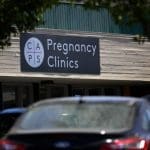Abortion debate shakes Pennsylvania state Legislature races
Republican candidates have scrubbed their websites of hardline anti-abortion rhetoric and changed their stances on exceptions ahead of the general election.

Less than a month out from Election Day, abortion access in Pennsylvania hangs in the balance. If Republicans win the governor’s race and keep control of the state legislature, the party is poised to ban abortion after six weeks — before most people know they are pregnant — without exceptions for rape or incest.
But thanks to recently redrawn district maps, this cycle is also Democrats’ best chance in a decade to retake control of the Pennsylvania House of Representatives. If Democrats are able to either flip the lower chamber of the state legislature or hold onto the governor’s mansion, they’ll be able to defend abortion rights through either the governor’s veto power or the speaker’s gavel.
The Republican speaker of the house, State Rep. Bryan Cutler, said that he would support legislation that would outright ban abortion in Pennsylvania and told the conservative Lancaster Patriot Podcast he thought a full ban could pass the Republican-controlled legislature. State Sen. Doug Mastriano, the Republican nominee for governor, introduced legislation that would ban abortion without exceptions after six weeks, and said at a primary debate that he’d support a total ban on the procedure “at conception.”
Since 2017, the state legislature has put three pieces of legislation on Democratic Gov. Tom Wolf’s desk restricting abortion beyond the 24-week limit enshrined in Pennsylvania law. Wolf, who opposes abortion restrictions, vetoed the bills.
House Bill 904, introduced by State Rep. Stephanie Borowicz last year, would have banned abortion after a doctor can detect a “heartbeat” — a misnomer because the fetus hasn’t developed a heart at this stage — often around six weeks, before most people know they’re pregnant. It received widespread support from the Republican caucus; 64 members were cosponsors.
“Under a Doug Mastriano governorship, we would expect an outright ban on abortion here in Pennsylvania,” Lindsey Mauldin, the vice president of advocacy and public policy at Planned Parenthood Southeastern Pennsylvania, who oversees the group’s political action committee, told the American Independent Foundation. “We should be prepared for abortion to be banned and potentially criminalized.”
Abortion is a key issue in high-profile races
The American Independent Foundation reached out to the 77 Republicans who are either running against an incumbent or contending for an open seat. Most candidates have no abortion policy on their website. Those who do have an anti-abortion policy use vague framing, describing themselves as supporting “the sanctity of life” and being nebulously “pro-life.”
Only four candidates surveyed by the American Independent Foundation said they support exceptions for rape and incest.
Joe Hogan, the Republican candidate to represent the 142nd District, told the American Independent Foundation that he is “personally pro-life,” but supports exceptions for rape, incest, and the life of the patient. “I believe that we can find common ground on this issue if we set aside the charged rhetoric,” he said. He did not say after how many weeks he would support a ban.
Republican David Burgerhoff, running in the 114th District, said that he’s “conflicted” having to balance his pro-life views with the views of his constituency:
I feel 14 weeks is a fair compromise. I am conflicted, as I’m 100% pro-life for constitutional reasons. However, representatives must be willing to advance the desires of their constituency. I am aware of a large consensus to allow for exceptions for rape, incest, and life of mom.
In the 20th District, Republican Matt Kruth told 90.5 WESA, Pittsburgh’s NPR affiliate station, he did not support Mastriano’s proposed six-week ban, and he supports exceptions for rape and incest. And former Allentown School Board Director Robert E. Smith Jr., running in the 22nd District, said he would support leaving the state’s laws intact.
The American Independent Foundation identified one Republican candidate, Jennifer Sodha, who said she does not support restricting abortion. A self-described “moderate Republican” running in the Philadelphia suburbs, she said one of her main goals as a legislator would be “protecting women’s choice.”
“I believe abortion should be rare but not illegal and certainly not criminalized,” Sodha says on her campaign website. “The burden of unwanted pregnancies is predominantly borne by women and the state legislating over women’s choices is not where we need to be.”
The politics around abortion are so contentious that one incumbent, Republican State Rep. Todd Stephens of the 151st District, threatened to sue his opponent over comments she made about his abortion stance. Melissa Cerrato, the Democrat in the race, accused Stephens of supporting a bill that would mandate lifetime imprisonment for abortion care providers and patients. The bill in question, House Bill 1095, did not pass, but would have required that anyone found guilty of third degree murder of an “unborn child” who has previously been convicted on murder or voluntary manslaughter charges be given a life sentence.
Planned Parenthood of Pennsylvania, which endorsed Cerrato after supporting Stephens in 2018 and 2020, noted in a statement that while the section of the penal code HB 1095 amended precluded charges from being brought against abortion providers or recipients, “the inclusion of this act in Title 42 would set a dangerous precedent that would further blur the line of ‘fetal personhood’ and potentially threaten pregnant people with investigation and criminalization.”
Stephens served Cerrato with a cease-and-desist order in August. His campaign did not return a request for comment.
Moving away from the fringe
Democrats have overperformed in special elections held across the country since the Supreme Court overturned Roe v. Wade (1973), the ruling that upheld a constitution right to abortion access. Abortion — which rocketed to the top of voters’ reported top issues — seems to be a liability for Republicans and a political winner for Democrats.
Republican candidates across the country have scrubbed their websites of hardline anti-abortion language and backed away from stances that could alienate more moderate voters. Polling from September shows that voters overwhelmingly support some exceptions to an abortion ban.
Republican Cindy Kirk, a former Allegheny County councilwoman and nurse running in the 30th District, used to say on her website that she would “protect the unborn right to life” during the primary. She altered that language over the summer to include exceptions in cases of rape, incest, or a threat to the patient’s life.
In the neighboring 33rd District, Republican Ted Tomson seems to have said one thing during the primary and another during the general election. A LifePAC voter guide circulated before Pennsylvania’s May 17 primaries indicated Tomson supported a ban on abortion without exceptions for rape and incest. But in an interview with CBS Pittsburgh last month, he said, “I am pro-life, and I do support exceptions for rape, incest, and life of the mother.”
Twelve other candidates on the LifePAC flier were listed as supporting a ban on abortion only with exceptions for the patient’s life — the most common position among the candidates TAIF surveyed.
Statehouse candidates aren’t the only ones softening their views on abortion.
Mehmet Oz, the Republican nominee for Pennsylvania’s open U.S. Senate seat, told a tele-town hall audience that abortion at any point in pregnancy was “murder,” but now supports exceptions for rape, incest, and the patient’s life.
Despite the surge of Democratic enthusiasm the end of Roe produced, it’s an open question whether it will be enough to counter the strong political headwinds the party has been struggling against since inflation began to rise last year.
But Maudlin, the Planned Parenthood Southeastern Pennsylvania vice president, said she doesn’t think the momentum has slowed. “What we’ve heard on the ground, what we’ve heard from pollsters, and what we’ve heard from candidates is that access to abortion care is one of the top issues for voters,” she said.
“Sometimes,” she added, “the political conversation takes away from the importance of what’s actually at stake here — these policy decisions will affect individuals’ ability to make their own health care decisions, and ultimately this will affect peoples’ ability to live full lives, and, in some cases, to live.”
Published with permission of The American Independent Foundation.
Correction 10/7/22 at 1:12 PM: edited to correct a typo.
Recommended

New NC GOP chair flirts with bogus stolen election conspiracies
Simmons predecessor was a staunch 2020 election denier
By Jesse Valentine - April 19, 2024
Texas activists pushed abortion restrictions in NM cities and counties, records show
Emails reveal influence and control in exchange for promises of legal help
By Austin Fisher, Source NM - March 04, 2024
Cannabis workers across Missouri begin push to unionize dispensaries
The first day was a breeze. Sean Shannon and Danny Foster walked into several marijuana dispensaries around Missouri with their matching “Union For Cannabis Workers” shirts and talked to employees about the possibility of unionizing. “The first day, there were 57 stops amongst the teams,” said Shannon, lead organizer with UFCW Local 655, which actually […]
By Rebecca Rivas - December 04, 2023










































































